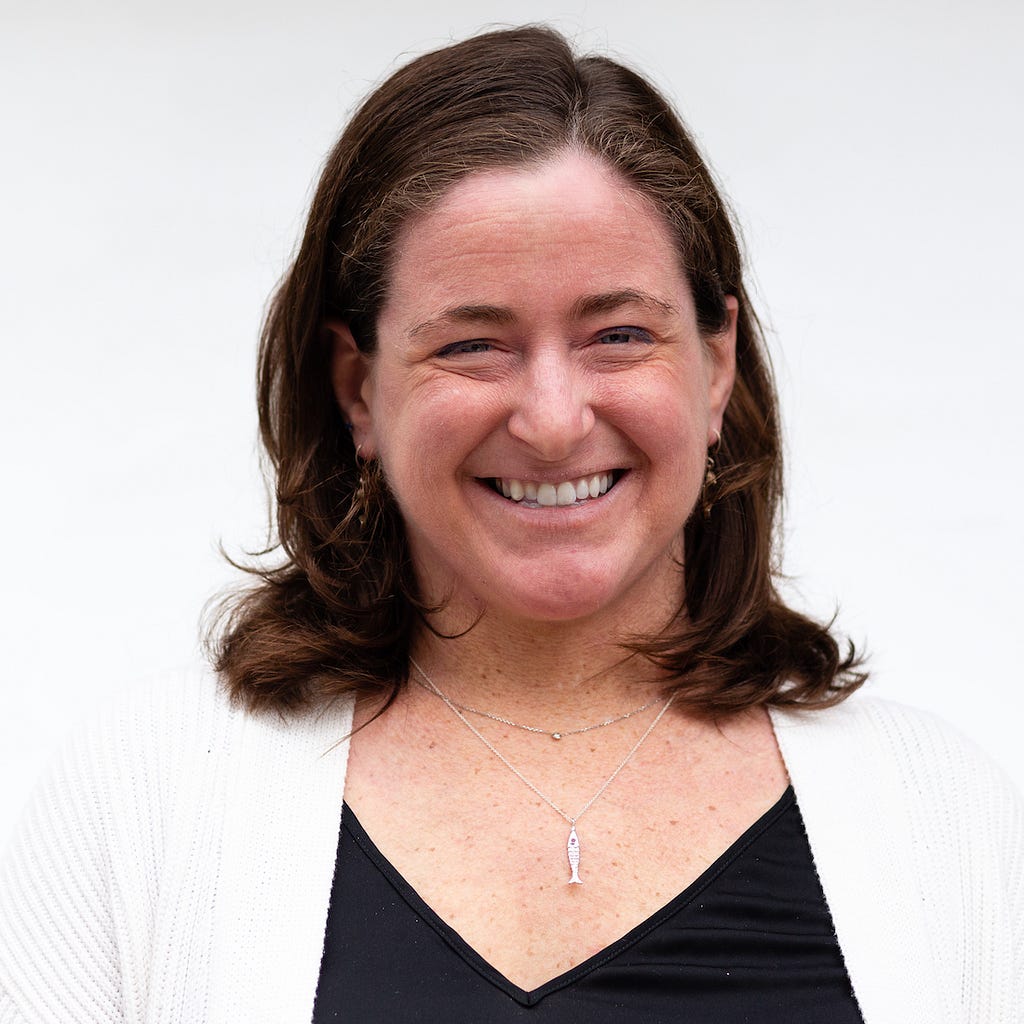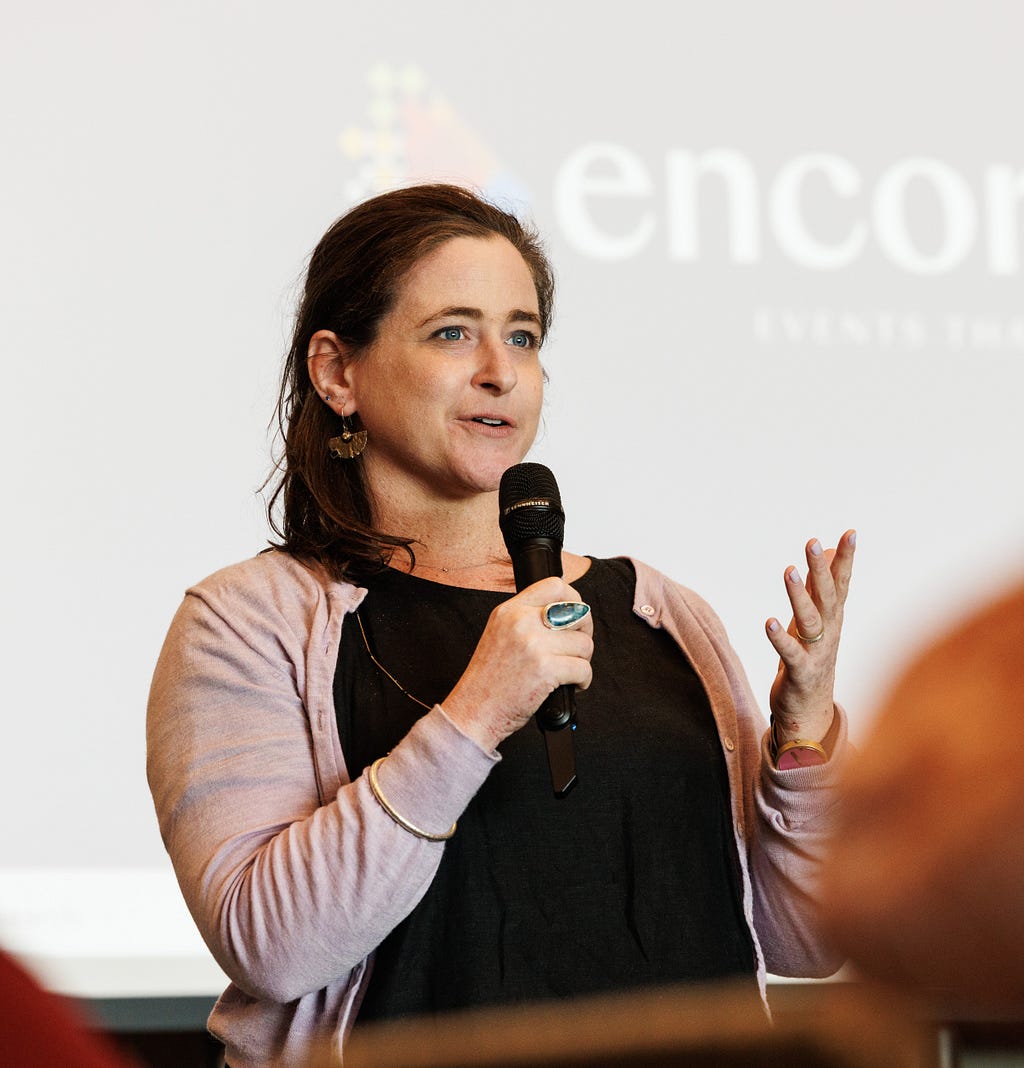Women In Wellness: Sarah Harris of Gladskin On The Five Lifestyle Tweaks That Will Help Support People’s Journey Towards Better Wellbeing
An Interview with Candice Georgiadis

Prioritize your health. There are a million ways, big and small, to take better care of yourself. I’m still learning how to do this, but it’s something I’m committed to, both for myself and the people I love.
As a part of my series about women in wellness, I had the pleasure of interviewing Sarah Harris.
Sarah Harris is Director of Brand Communications at Gladskin, a skincare company on a mission to improve quality of life for millions of people with inflammatory skin conditions worldwide. Sarah has written extensively about living with severe eczema and is committed to making the skincare industry more inclusive. She lives in Vermont with her husband and two cats.
Thank you so much for joining us in this interview series! Our readers would love to “get to know you” better. Can you share your “backstory” with us?
I grew up in Dallas, Texas and developed severe eczema when I was three. My mother was determined to find something, anything, that would help my skin. We tried all kinds of treatments. She shuttled me to dozens of doctors, including dermatologists at Johns Hopkins and Oregon Health and Science University, where I spent a week in the hospital under the care of a leading eczema scholar. When I wasn’t getting better using western medicine, we tried homeopathy, acupressure, ayurveda, and hypnotherapy.
I was privileged in many ways — I had access to great medical care, my parents were able to send me to a private girls’ school, where I thrived, and I wasn’t terribly bullied for my skin. But even so, growing up with severe eczema was not easy. You look — and feel — different from your peers. Your skin is always on display for people to see. You have to come to terms with your own boundaries and limitations. You have to learn how to integrate your skin condition into who you are. It’s a journey that’s had a profound impact on my life — and it’s so meaningful for me to now be bringing those insights into my career.
Can you share the most interesting story that happened to you since you started your career? What were the main lessons or takeaways from that story?
I’ve had a lot of interesting career experiences over the years — I worked as a public radio reporter in rural upstate New York, taught audio storytelling to Afghan high school girls through a grant from National Geographic, produced podcasts, executed feminist marketing campaigns, and worked at a drone technology startup and innovation advisory firm.
Throughout all of that, I was dealing with severe eczema, and I found that I wanted to talk about that experience. So, I started writing about it for publications like Jezebel and the Cut. I sought out the eczema community online and got involved with the National Eczema Association, which is a wonderful patient advocacy organization. And I discovered Gladskin, the skincare company where I now work. Gladskin struck me as really different from other skincare brands — it’s a company that’s pioneering exciting microbiome science and is deeply committed to serving people with inflammatory skin conditions. I loved the science, the mission, and the ethos, and I wanted to be part of it.
And that’s why the most interesting part of my career is what’s happening now. I’m applying a lifetime of first-hand eczema knowledge to my day-to-day work. I’m thinking about how living with eczema, acne, and rosacea can really shape you, how people with inflammatory skin conditions have been traditionally left out of the skincare conversation, and how Gladskin can change that.
Can you share a story about the biggest mistake you made when you were first starting? Can you tell us what lesson you learned from that?
When I was in my early twenties, I worked as a public radio reporter. I loved the writing, interviewing, and storytelling — which meant that I said yes to everything my bosses asked me to do, and more. The problem was that I didn’t know how to say no. I didn’t know how to create healthy boundaries between my work and the rest of my life. I wanted people to take me seriously, and I felt an enormous pressure to always be right. Unsurprisingly that led to major burnout — and a terrible eczema flare. My skin was in such bad shape that I struggled to function. But I didn’t know how to ask for help, or how to seek the accommodations I needed. I finally got my skin under control and ended up leaving that job a couple months later. I’ve learned, now, that no job is worth sacrificing your health for. I’ve learned how critical it is to make time to rest. I can now see that ableist thinking prevented me from seeking more tools, resources, and accommodations. And I’ve realized how critical it is to be honest with your community, your colleagues, and yourself about how your health impacts your life.
Let’s jump to our main focus. When it comes to health and wellness, how is the work you are doing helping to make a bigger impact in the world?
There are over 1 billion people with eczema, acne, and rosacea globally. Living with these conditions is tough — in addition to making your skin really uncomfortable, they can do a number on your self-esteem and mental health. Existing treatment options often fall short — they prioritize quick relief and making your condition less visible, but they don’t always look out for your long-term skin health.
Gladskin is changing that by focusing on the next frontier in inflammatory skin conditions: the skin microbiome. Our products use patented endolysin science to balance the skin microbiome and restore skin health. It’s an exciting new paradigm for addressing inflammatory skin conditions, which are often driven by bacterial imbalances on the skin.
We have this internal mantra at Gladskin — help as many people as soon as possible. Our team really abides by that ethos, and we want to deliver lasting relief in a way that’s safe and sustainable. You can’t cure inflammatory skin conditions, but you can make the skin healthier and stronger — and when you do that, your skin condition doesn’t rule your life anymore. That’s a powerful way to make people’s lives better, and I’m really committed to that.
Can you share your top five “lifestyle tweaks” that you believe will help support people’s journey towards better wellbeing? Please give an example or story for each.
- Prioritize your health. There are a million ways, big and small, to take better care of yourself. I’m still learning how to do this, but it’s something I’m committed to, both for myself and the people I love.
- Don’t be afraid to ask for help. Whether you’re managing a chronic illness, dealing with mental health challenges, or just navigating life’s ups and downs, know that you’re not in it alone. Big things are easier when we face them together.
- Get the rest you need. Living with chronic eczema has taught me that I need more rest than most people. If I don’t make time for it, my body sounds the alarm — usually with a skin flare!
- Take time for yourself. Put productivity culture aside and do things that make you happy. This year I planted a garden and started playing the piano again. I’m not particularly good at either one of them, but they bring more joy into my day.
- Laugh more. There’s nothing like a big belly laugh to make you feel good. When I laugh like that, it’s usually because I’m spending quality time with people I love — a sure-fire way to fill your cup.
If you could start a movement that would bring the most amount of wellness to the most amount of people, what would that be?
This is such an interesting question! I think I’d want everyone to be at home and at peace in their skin. We’re so focused on youth and beauty that we overlook skin health. I’d love to change that. I’d love to banish “good skin” and “bad skin” from our vocabulary. I’d love to normalize aging. I think it’s important to acknowledge how centuries of colonialism and white supremacy have given rise to practices like skin bleaching. Ultimately, I think we need to create more expansive, more inclusive beauty norms, and see skin not just as a social cultural marker, but also as an incredibly complex and powerful organ that plays a major role in our health and wellbeing.
What are your “5 Things I Wish Someone Told Me Before I Started” and why?
- You don’t have to know everything. Nobody is an expert at the beginning of their career, and we’re all learning new things all the time. Instead of trying to be right, commit to being open, honest, and curious. You’ll learn more and build deeper relationships that way.
- Don’t be afraid to ask questions. Working as a reporter taught me to use questions as an invitation for dialogue. I use this in all aspects of my work, and it makes me a better thinker and colleague.
- Work with people who have your back, and don’t tackle the hard stuff alone. When I’m working on projects that stretch me, or that have a great deal of ambiguity involved, I take a lot of comfort in knowing that I have a team I can trust and rely on.
- It’s ok to switch jobs — and careers. We are constantly growing and changing. Our lives change too, and what works for you at one stage may no longer be a fit a few years down the road. I’ve gotten comfortable with that idea, especially after a few career pivots.
- Let who you are inform what you do. I find that I’m more motivated and effective when I’m passionate about what I’m doing. It’s been so powerful for me to bring everything I’ve learned from living with severe eczema for 30+ years to my work at Gladskin.
Sustainability, veganism, mental health, and environmental changes are big topics at the moment. Which one of these causes is dearest to you, and why?
This is a hard question because I care a lot about these topics. But when I think about my work, and my involvement in the eczema community, mental health really rises to the top. The relationship between the mind and the skin is a powerful one. Living with a visible skin condition can have a profound impact on how others perceive us — and how we perceive ourselves. Our skin can make us self-conscious or socially anxious. Kids with eczema often get bullied, and people with eczema are 44% more likely to exhibit suicidal ideation. Stress makes inflammatory skin conditions worse. Doctors are just beginning to acknowledge how powerful the mind-skin connection is, and how much mental health support people with skin conditions need, but there is still a long way to go.

What is the best way for our readers to further follow your work online?
The best way to keep up with my work is to follow Gladskin on Instagram — our handle is @gladskin.us. You can also follow me personally on LinkedIn and Instagram.
Thank you for these fantastic insights! We wish you continued success and good health.
Women In Wellness: Sarah Harris of Gladskin On The Five Lifestyle Tweaks That Will Help Support… was originally published in Authority Magazine on Medium, where people are continuing the conversation by highlighting and responding to this story.

